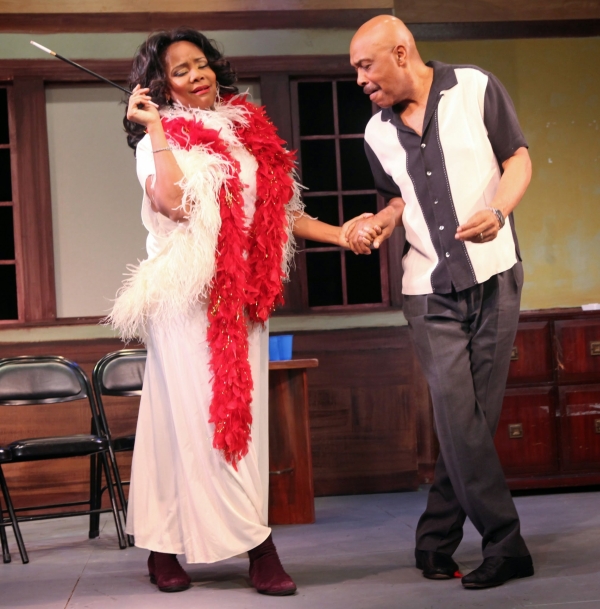The Fabulous Miss Marie
Tonya Pinkins leads a stellar cast in this revival Ed Bullins’ party play.

(© Gerry Goodstein)
Is it possible to be simultaneously ugly and fabulous? Tony Award winner Tonya Pinkins (Caroline, or Change) performs just such a feat in Ed Bullins' The Fabulous Miss Marie, which is now receiving a revival from Woodie King Jr.'s New Federal Theatre at Castillo Theatre. Bullins draws a scathing caricature of the black middle class of the early 1960s, with the titular Miss Marie (Pinkins) starring as its glittering, gaudy, and thoroughly grotesque poster child. Four decades after its premiere, this incendiary play still has the power to make audiences feel deeply uncomfortable, while simultaneously making us laugh.
First produced at Harlem's New Lafayette Theatre in 1971, The Fabulous Miss Marie actually takes place a decade earlier on the other side of the country: Marie and Bill Horton (Roscoe Orman) are living the high life in Los Angeles. Bill makes good money working as a valet in Beverly Hills and Marie always finds ways to spend it: on parties, trampy dresses, and Ambassador scotch. "We make almost as much as some colored doctors make," they sing while doing a little tap dance, as if they were performing the opening credits to the world's most demented BET sitcom.
The play happens over the course of a three-day holiday party at their home in The Wilshire. The Hortons drink, watch porn, and have affairs while an array of characters parade in and out: Art Garrison (Ashley C. Turner) is their semipermanent houseguest and Marie's piece on the side. Toni (Aaliyah Habeeb) is Marie's best frenemy (she's also sleeping with Art). Ruth (Toccarra Cash) is a Texas cowgirl/independent woman.
Beethovan Oden offers a hilarious portrayal as Gafney, a militant black nationalist in a Dashiki. With stilted speech reminiscent of Malcolm X, he chides Art for being a black cliché (oh, the irony!). His derrière is so tightly clenched, it practically squeaks when he walks.
The characters directly address the audience as if we were also guests at the party, giving us a slice of black life in the early 1960s. These aren't the infinitely relatable characters of an August Wilson play, nor are they civil-rights crusaders (with the possible exception of militant Gafney). They're just regular people, aspiring to upward mobility, concerned with very little beyond their own material comfort and that of their immediate circle. In that respect, they're the most relatable characters of all (not that we would want to admit it).
Pinkins spends the majority of the show wobbling around in a pair of pumps and clutching a tumbler full of Scotch. Every entrance is an opportunity for a costume change, each more ridiculous than the last. Her hair plastered to her head, Pinkins precariously spills out of a leopard-print dress with a slit right up the center. This daring display of sideboob paves the way for several monologues in which she lets it all hang out: She knows about Bill's cheating, but she's too comfortable to let that ruin her good time. Pinkins forges a genuine connection with the audience, winning us over on Marie even though she's dressed like a busted drag queen.
Ali Turns' porno-inspired costumes are delightful in their ability to play against the text, making this acid trip of a party even more disorienting. Toni enters wearing space opera-silver go-go boots and a Pulp Fiction-esque wig. "I'm a social worker," she casually informs us. Lest you think only the women suffer such objectification, boy-toy Art wears a skin-tight polo shirt throughout, leading Marie to go straight for his protrusive nipples whenever they interact. Ademola Olugebefola'a set is similarly ridiculous, complete with a plastic-wrapped sofa and bead curtains.
Director Woodie King, Jr. draws out the cartoonish nature of the play without sacrificing the humanity of its characters. The story unfolds like the Scotch-soaked memories of a grand bacchanal: It's a highlights reel of words and pictures, not necessarily presented coherently. Accordingly, several of the offstage lines are delivered with a prerecorded echo, like a voice in one's head (sound design by Bill Toles). It's a trippy effect, but it doesn't quite add anything to the story. In fact, this design choice sometimes obfuscates moments that are perfectly clear in the script, like Ruth's crack-up about the civil-rights protestors. In this production, it feels like she's speaking from another dimension.
That minor weirdness aside, there's plenty to like about this excellent revival: The outstanding cast brings Bullins' characters into sharp focus, offering a vivid snapshot of the not-so-distant past.











